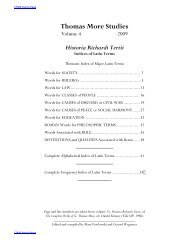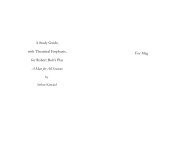life of john picus earl of mirandola - The Center for Thomas More ...
life of john picus earl of mirandola - The Center for Thomas More ...
life of john picus earl of mirandola - The Center for Thomas More ...
Create successful ePaper yourself
Turn your PDF publications into a flip-book with our unique Google optimized e-Paper software.
[104]<br />
50 <strong>Thomas</strong> <strong>More</strong>’s Life <strong>of</strong> John Picus<br />
TWELVE RULES 1 OF JOHN PICUS EARL OF MIRANDULA,<br />
PARTLY EXCITING, PARTLY DIRECTING A MAN IN<br />
SPIRITUAL BATTLE<br />
If We refuse the Way <strong>of</strong> Virtue <strong>for</strong> that° it is Painful, <strong>for</strong> the Like Cause<br />
ought We to refuse the Way <strong>of</strong> Sin. 2<br />
Whoso° to virtue esteemeth hard the way 3<br />
Because we must have war continual<br />
Against the world, the flesh, the devil, ⌐ that aye°<br />
En<strong>for</strong>ce° themself to make us bond and thrall,° ¬<br />
Let him remember that choose what may he shall<br />
Even after the world, 4 yet must he need sustain°<br />
Sorrow, adversity, labour, grief, and pain.<br />
<strong>The</strong> Second Rule.<br />
Think 5 in this wretched worldès busy woe 6<br />
<strong>The</strong> battle more sharp and longer is I wis°<br />
With more labour and less fruit also<br />
In which the end <strong>of</strong> labour labour is:<br />
⌐ And when the world hath left us after this<br />
Void <strong>of</strong> all virtue: the reward when we die<br />
Is nought but fire ¬ and pain perpetually. 7<br />
7 <strong>for</strong> that because / 10 Whoso Whoever / 12 aye ever, always / 13 En<strong>for</strong>ce exert / thrall<br />
slave / 15 sustain endure, suffer / 21 wis know<br />
1. TWELVE RULES: Originally written in prose, Picus’ “Rules” are trans<strong>for</strong>med by <strong>More</strong> into<br />
poetry.<br />
2. If We . . . Way <strong>of</strong> Sin: This sentence was originally a sidenote in the 1557 edition, published<br />
after <strong>More</strong>’s death in 1535. Thus, it is an insertion by a later editor.<br />
3. Whoso . . . the way: That is, “Whoever considers the way <strong>of</strong> virtue difficult…” <strong>The</strong> original reads:<br />
si homini videtur dura via virtutis, “if the way <strong>of</strong> virtue seems hard to someone” (CW 1:372, 373).<br />
4. choose . . . the world: In other words, “whatever <strong>life</strong> one chooses, even the pursuit <strong>of</strong> worldly<br />
pleasures…” Such also is the sense <strong>of</strong> the Latin original: quamcunque elegerit vitam etiam secundum<br />
mundum (CW 1:372).<br />
5. Think: <strong>More</strong>’s rendering <strong>of</strong> the Latin recordetur, “let him remember” (CW 1: 372, 373). Throughout<br />
the “Rules” <strong>More</strong> translates recordetur variously—as “think” as well as “let him remember”<br />
(e.g., <strong>earl</strong>ier in 50.14) and “consider” (as found below in 50.30). <strong>The</strong> recurrence <strong>of</strong> recordetur and<br />
variations there<strong>of</strong> underscores the meditative character <strong>of</strong> the “Rules.”<br />
6. wretched . . . woe: <strong>More</strong>’s expansion <strong>of</strong> rebus mundi, “affairs <strong>of</strong> the world” (CW 1:372, 373).<br />
7. And . . . perpetually: <strong>The</strong>se three lines are <strong>More</strong>’s expansion <strong>of</strong> the Latin & tandem paena eterna,<br />
“and, finally, eternal punishment” (CW 1:372, 373).<br />
5<br />
10<br />
15<br />
20<br />
25











